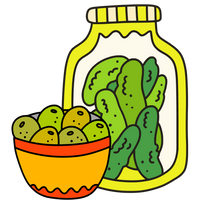
We tout "unpasteurized" as a feature of our fermented products, and its common to hear comments such as, "I'm not sure why being unpasteurized is a good thing" and, "If there are good bacteria in your products, that means there is potential for bad ones too." In this article we'll address these questions and concerns and explain why bacteria loaded fermented foods are not just perfectly safe, but incredibly good for your health.

How can bacteria in food be a good thing?
If you're like most people, you may think of bacteria as something that makes you sick. But what if we told you that some types of bacteria are actually good for you? In fact, certain bacteria is beneficial and can help keep your gut healthy and promote a strong immune system.
You've likely heard about probiotics, which are defined as beneficial bacteria that confer a health benefit. There is an entire supplement industry that's been built up around probiotic supplements, but there's an entirely different way to consume these beneficial bacteria and that's through eating and drinking live, raw, unpasteurized—and therefore probiotic—foods and drinks.
Kombucha is a great example of one such probiotic product. Kombucha is fermented tea, which is brewed with what's called a scoby, or a 'mother', a bacterial blob (for lack of a better word) that forms and grows from batch to batch and helps to proliferate probiotic bacteria in the kombucha batch.
First, Fermentation 101
The kind of fermented food that we focus on here at Olive My Pickle is fermented vegetables, also known as pickles, sauerkraut, kimchi, veggies and live culture olives (as opposed to pasteurized olives, which are devoid of probiotic bacteria.) Fermented foods, through the process of lactic acid fermentation become powerhouses of beneficial bacteria. This is achieved through the combination of salt water brine, the elimination of oxygen within the fermentation batch, the manipulation of the temperature and the process of time.
Fermented vegetables are considered modern day superfoods and are on the recommended list of foods to eat daily of nutritionists, functional medicine doctors, health coaches, and just about every MD influencer on Instagram these days. That's because the scientific research within the last five years has shown the importance of eating fermented foods for a healthy microbiome.

Fermentation, an ancient process
Although fermentation has risen in popularity within the last ten years, it's by no means a new innovation. Quite the contrary, fermentation was how our ancestors preserved food for thousands of years, before electricity and refrigeration existed. Fermentation traditions spanned the globe as humans across continents discovered that salt could be used to preserve food.
For example, sauerkraut and fermented vegetables like giardiniera are European traditions. Kimchi and miso are Asian fermented vegetable traditions. The many fermentation traditions span far beyond fermented vegetables—traditions like beer, wine, fermented/cured meats, tempeh-- and to cover these is outside the scope this article.
Second, some microbiome basics
Your microbiome is the colony of bacteria that lives in and on your body, mostly within your gut tract. It works within your body to get important jobs done, such as appetite regulation, body weight moderation, and importantly immune system function. Its role is so important, the microbiome has been likened to a vital organ, and it even weighs as much—2 to 3 pounds.
Microbiome research is the leading area of 21st century nutritional health science. We're currently in the very early days of understanding its true significance. One thing that is clear is that the microbiome thrives under certain conditions and withers under certain conditions. A way to eat so that the microbiome can thrive is the Mediterranean diet, which has been scientifically validated to improve health and microbiome strength.
Back to the topic of safety
But are bacteria in fermented foods safe? Is there a danger of bacterial contamination? Since they're unpasteurized, is there a risk of botulism and food borne illness? Let's take a closer look at the process of fermentation and pasteurization to find out.

What is pasteurization?
Pasteurization heats food, completely eliminating all live cultures, enzymes and good bacteria from them. The temperature to pasteurize is 144° F.
Lactic acid bacteria, like lactobacillus, the good kind of bacteria that nourishes your gut biome and is found in fermented foods, will remain alive in temperatures ranging from below freezing up to 143° F.
Is pasteurization bad?
Here at Olive My Pickle, we boast ‘unpasteurized’ as both a feature and benefit of our fermented foods. This often brings up the question, “I’m not sure why pasteurization is a bad thing?” Many people associate pasteurization with food safety, edibility and a gold standard of excellence.
First, we do acknowledge that pasteurization has no doubt saved countless lives, since its advent in the early 1900s. Louis Pasteur who discovered and patented pasteurization is considered a food hero, and we could not agree more.
A brief history of pasteurization and food preservation
When the industrial revolution occurred and mass migration to cities and factory life became a reality, the industrialized food era was ushered in. We saw a shift from diets supported by small family farm life to factory processed “foods” (ahem, Wonder Bread and Spam) within a matter of just a few decades. The shift to factory produced food necessitated pasteurization to ensure food safety.
Another historical event that ushered in both pasteurization and an affinity for sterilization of food was the mid-1800s problem of raw milk in cities, which was responsible for thousands upon thousands of deaths, mostly in babies. This was a huge crisis at the time which pasteurization cleared up almost overnight. It's important to say that the problem was not raw milk per se, it was how the cows were fed and housed within cities—in incredibly filthy and disease ridden conditions—these conditions created pathogenic milk.
The arrival of pasteurization was a huge step forward for food safety. It was innovative, life saving technology. It became synonymous with safety, purity, security, confidence and excellence. However, there were some unintended consequences.

Unintended consequences of sterilizing food in modern day life
Sterilizing foods is now understood to be one of several driving factors in the disruption of healthy microbiota within the human gut. Compounded with other influences of modern day life that disrupt the gut biome that including chronic stress, inadequate sleep, less time spent in nature and the proliferation of ultra processed foods, we are now facing a state of crisis in our collective national health.
The American obsession with cleanliness and sterility is taking a toll on our collective gut health. Some other drivers include:
-
The overuse of antibacterial soaps, sprays, cleansers and hand gels.
-
The fact that small children spend less time outside and in contact with dirt during the critical first two years of life when the resident microbiome is developing.
-
The over-prescription of antibiotics—a recent study was published and found that 7 in 10 doctors give patients unnecessary antibiotic prescriptions for asymptomatic infections.
All of this compounds into weakened microbial diversity in the gut.

What about pasteurization and fermented food safety?
Are there any risks associated with consuming unpasteurized fermented vegetable foods like pickles, sauerkraut, kimchi and olives, or am I fine eating fermented foods?
No. Fermented foods are intrinsically food safe due to their pH level, which measures at about 3.5. This pH level is sufficiently acidic to inhibit the growth of harmful pathogens. Here at Olive My Pickle, we pH test 100% of our fermentation batches, to ensure they are within acceptable pH levels.
Because of their acidity, fermented foods are considered by governing regulatory bodies such as our own state health department here in Florida, to have GRAS status, which stands for ‘generally regarded as safe.’
The term pH is used as a symbol to designate the degree of acidity of a food. The scale for measuring pH is from 0 to 14. It can be a little confusing, because the higher the pH score, the lower the acidity of the food.

The pH of a food that is 7.0 is neither acidic or basic and is considered “neutral”. A pH less than 7.0 indicates that a food is “acidic.” A pH range greater than 7.0 refers to a food that is “basic”. Most foods are in the acidic range, or less than 7.0 pH. Anything over 7.0 is alkaline.
Harmful bacteria that will cause food poisoning tend to prefer conditions that are near pH 7.0 but are capable of growing in a pH range of 4.6-7.0.
Fermented foods are below this, between 3.5 and 4.0 acidity, thus well within the range of safety from food pathogens.
How does pasteurization affect the nutritional value of foods, and is it necessary for safety reasons?
Pasteurization serves the purpose of keeping factory processed foods safe from pathogens. In that respect, it is 100% necessary.
As our collective health consciousness evolves, we hearken back to the wisdom of our ancestors. More people than ever are switching to less processed and whole health foods, as evidenced by the growing trend of natural food brands and the dying out of relic food-products from the industrial-food era. The movement to take back our health is well underway.
To this end, we’d argue that consuming anything ultra processed (and thereby necessary to pasteurize) is best avoided for those seeking a long, happy and healthy life.

Health benefits of eating fermented foods
One of the best things you can do for your gut health is to start eating fermented foods, along with plenty of fiber and nutrient-dense whole foods.
As new science emerges, validating the relationship between live culture fermented foods and better gut health, both the scientific and nutritional communities are promoting raw, unpasteurized ferments as a recommended part of daily healthful eating.
Where can I find most fermented foods?
Raw and unpasteurized fermented foods can be hard to find. Some people take a DIY approach and try their hand at making fermented foods themselves. If you're able to do that, go for it! But if you're not too keen on the fermentation process or just don't have the time to do it yourself, you have other options.
If you're lucky, you may be able to find fermented foods at your local farmers market, and even some grocers. Just make sure what you're buying is indeed raw and unpasteurized and doesn't contain vinegar.

Pickled vegetables in vinegar do not undergo the fermentation process and therefore do not produce the digestive health benefits of lactic acid bacteria—that's the probiotic bacteria we want. Learn exactly what to look for by reading our article Vinegar vs. Fermented: A Guide to Shopping for Real Fermented Pickles.
What if local fermented foods aren't an option?
That's where we come in. Here at Olive My Pickle, we've been specializing in fermented foods since 2010. We make over 35 varieties of fermented, pickles, olives, sauerkraut, kimchi, vegetables, and brines. It's never been easier to get real lab-verified probiotic rich foods delivered right to your door!
If you're ready now, check out our selection of 35+ fermented foods. We're sure you'll find a fermented food you'll love, and your gut will thank you.








